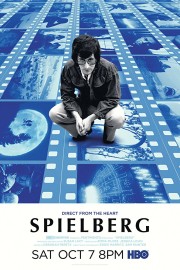Spielberg
I’m no going to lie- when I am afforded the chance to get up close and personal with a public figure I admire, it’s pretty damn exciting. I think that’s a big part of why I’ve enjoyed the interviews I’ve gotten to do with people for the Sonic Cinema Podcast, and it’s a huge part of what I love about going to Dragon*Con each year, and why Star Wars Celebration made the ungodly lines worthwhile in April. It’s also played into some of the movies and documentaries I watch the most, as well. One of my favorites has been the 2007 Turner Classic Movies documentary, “Spielberg On Spielberg,” wherein Steven Spielberg discussed his career in stages, at flashpoints, and some of the most vital films and the themes he explored. The fact that Spielberg is my favorite filmmaker of all-time is merely a bonus to that film. When I heard another documentary, produced by HBO, was set to debut soon, I got pretty damn excited. Susan Lacy’s “Spielberg” is worthy of the excitement.
When I first started collecting DVDs, like many film fans, the behind-the-scenes and commentaries were a huge selling point. One of the biggest disappointments in those early years was that Spielberg, though he offered much in the way of quality documentaries about his films, did not record commentaries. While I respect his choice and reasons for not doing them, I’ll admit that something like “A.I.” or “Adventures of Tintin” or “Saving Private Ryan” is begging for a play-by-play from one of the greatest filmmakers of all-time. Lacy’s documentary, like the TCM doc that preceded it, feeds that itch capably, as she interlaces interviews with Spielberg, family, and filmmaker friends like Martin Scorsese and George Lucas with rare behind-the-scenes of the director from both his early work in television to his film career to this day. We also get as up-close with his personal life, his family, and his relationships with Amy Irving and Kate Capshaw, as I’ve seen in any documentary about the filmmaker. We also get a glimpse of the ’70s atmosphere of the “film brats” like he, Lucas, Scorsese, Francis Ford Coppola and Brian De Palma and how they played off of one another at that heady time in their career. In form and entertainment value, I was reminded a lot of Steve James’s Roger Ebert documentary, “Life Itself,” in how it wrapped all of the aspects of its subject’s life into his career, and how it was shaped.
Taken in conjunction with “Spielberg On Spielberg,” and even separate from it, “Spielberg” provides one of the richest portraits of a filmmaker I’ve ever seen. I certainly wish I could have seen (and heard) him discussing his friendship with Stanley Kubrick that lead to his criminally-undervalued, “A.I. Artificial Intelligence”; his performance-capture adventure, “The Adventures of Tintin”; heard from people whose careers he aided in like Joe Dante (“Gremlins”) and Chris Columbus (“The Goonies”); and delved more into his work as a producer, especially from the 1980s. The truth is, though, that one cannot look a gift horse like “Spielberg” in the mouth, however, when you have his family discussing their lives and how what was once separated by divorce came back together in old age; the way the “film brats” intersected in their careers and how they helped one another, at times; the way Kate Capshaw helped Spielberg get back in touch with his Jewish side, and how that led him to finally direct “Schindler’s List”; the way that critics and collaborators give us a rich perspective on how he worked on different films (the moments “Schindler’s List” is discussed by the actors, and we see behind-the-scenes footage from the set, for a project he never wanted seen as “just another film,” are illuminating for this Spielberg fan); and the way we see how he views his work in hindsight, especially with films like “The Color Purple” and “Empire of the Sun,” and how those early attempts at more “grown-up” filmmaking influenced his later films. For a film geek, and especially, for someone who cites Spielberg as their favorite filmmaker of all-time, this is a treasure trove of cinema.
One of my favorite stories about Spielberg is how he sat and watched “Lawrence of Arabia” with David Lean, one time, and the great director gave Spielberg a running commentary while watching the film. Spielberg doesn’t mention that in Lacy’s film, but he does mention “Arabia,” and the effect it had on him as a filmmaker. It’s interesting how, when he first saw it, it inspired him to not pursue filmmaking because it “raised the bar too high” for him, and it was in rewatching the film, and seeing new things, that led him to reconsider that. This is the sort of personal insight into how we watch movies, and how we are affected by movies, that I love most. It’s why Scorsese’s 4-hour documentaries of American and Italian cinema are essential viewing to me, and should be for others. It’s why Ebert became such a vital voice for me through his Great Movies series, and how it shaped my own writing on cinema. It’s why I love the work of Drew McWeeney, a fellow online critic who has written beautifully about sharing films with his own kids in his Film Nerd 2.0 series, and whose podcast, 80s All Over, has inspired me in not just watching films I hadn’t before, but in raising the bar for my own podcast. I watch “Spielberg,” and I was reminded of the excitement of listening to commentaries and watching documentaries on some of my favorite films, and I am energized to bring my own experiences into my writing on film, and excited about the creative possibilities that might open up from revisiting some of these films again, and being inspired by them, like Spielberg was when he watched “Lawrence of Arabia.”










